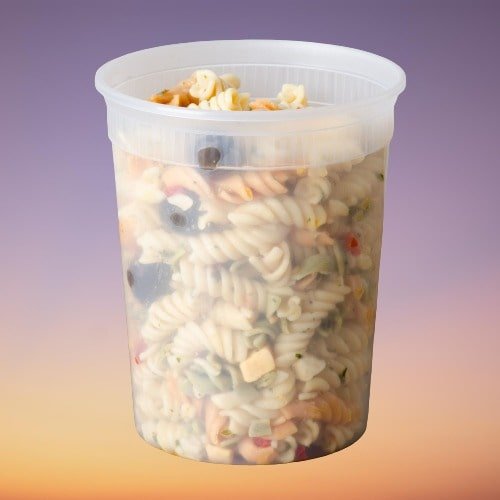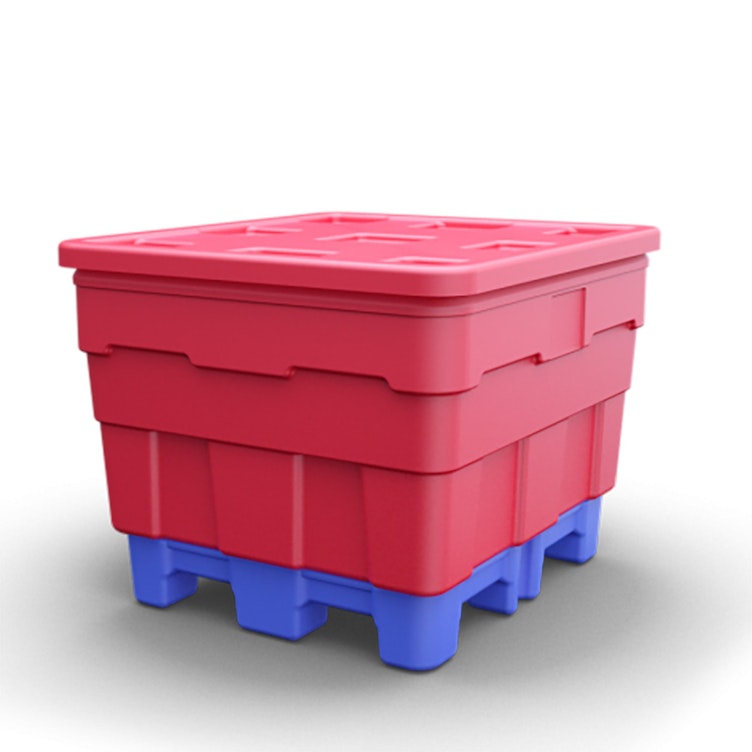A Comprehensive Guide to the Different Types of Bulk Plastic Containers Available Today
Mass plastic containers play a crucial role in numerous sectors, supplying remedies for storage and transportation. Their varied kinds provide to various requirements, from inflexible choices for strong materials to flexible containers fitting different shapes. Each kind presents distinct benefits, making it necessary to understand their applications and attributes. As sectors develop, so do the needs for reliable container services. What factors should one take into consideration when picking the ideal bulk container?
Summary of Bulk Plastic Containers

Kinds of Bulk Plastic Containers
Mass plastic containers come in different forms, each matched to specific applications. Stiff bulk containers, adaptable bulk containers, and intermediate mass containers stand for the key classifications, each offering unique benefits. Recognizing these types is vital for selecting the ideal container for carrying and keeping materials.

Rigid Mass Containers
Stiff bulk containers are essential for reliable storage and transport of various products throughout sectors. These containers are commonly constructed from sturdy plastics, permitting them to stand up to harsh handling and environmental problems. They can be found in different sizes and shapes, including totes, drums, and containers, making them appropriate for saving whatever from granular compounds to fluids. Stiff containers frequently include reinforced walls and safe lids, making certain the components remain protected during transit. Their stackable style makes the most of storage room, making them excellent for stockrooms and manufacturing facilities. Additionally, numerous inflexible bulk containers are recyclable and reusable, adding to sustainability initiatives. Generally, their effectiveness and flexibility make rigid bulk containers a crucial element in supply chain procedures.
Adaptable Bulk Containers
Flexible mass containers, typically described as adaptable intermediate mass containers (FIBCs), function as a functional service for storing a range and transporting of dry products. These containers are commonly made from woven polypropylene and are developed to be lightweight yet strong, enabling efficient handling and piling. Their flexibility allows them to accommodate various sizes and shapes, making them appropriate for items ranging from grains to chemicals. FIBCs can be outfitted with features such as spouts for simple filling and discharge, along with safety finishings for boosted resilience. In addition, they are multiple-use and recyclable, contributing to sustainable methods in sectors like farming, food handling, and construction. In general, adaptable mass containers use a efficient and cost-efficient option for bulk material administration.
Intermediate Bulk Containers
Intermediate bulk containers (IBCs) are crucial for the efficient transport and storage space of liquids and granular products throughout numerous industries. These containers commonly have a capability varying from 275 to 330 gallons and are developed for very easy taking care of and piling. Made from durable products like high-density polyethylene or steel, IBCs provide superb protection versus contamination and environmental variables. Their style consists of features such as a built-in pallet for forklift access and a removable top for simple filling and cleansing. IBCs are widely made use of in chemical, food, and pharmaceutical sectors, making sure compliance with safety regulations. Their versatility and reusability make them an economical option for bulk storage space and transport, adding to provide chain effectiveness and sustainability.
Functions and Benefits of Bulk Plastic Containers
Bulk plastic containers are essential tools in different industries, offering a mix of durability and practicality. These containers are constructed from high-grade products, making them immune to impacts, chemicals, and ecological factors. This toughness warranties item safety throughout storage and transport.
Additionally, bulk plastic containers are lightweight, promoting simplicity of reducing and taking care of delivery costs. Their stackable layout maximizes storage space efficiency, enabling enhanced warehouse room. Many versions feature safe covers or closures, offering an impermeable seal that preserves components and stops contamination.
Mass plastic containers are recyclable and often reusable, adding to lasting methods. Their convenience enables a variety of applications, from food storage to commercial usage, enhancing their worth throughout sectors. Services take advantage of the lengthy life-span and low maintenance needs of these containers, making them an affordable service for both temporary and long-lasting demands.
Industries That Utilize Bulk Plastic Containers
Different sectors benefit from the usage of bulk plastic containers, each leveraging their special buildings for details applications. The food and beverage market counts on these containers for secure storage and transport of products, while the chemical manufacturing sector uses them for handling harmful products. In addition, the pharmaceutical distribution needs highlight the value of resilience and sanitation in packaging services.
Food and Beverage Market
As the need for risk-free and efficient storage services remains to rise, the food and drink market increasingly counts on mass plastic containers for their operational needs. These containers provide durable, light-weight, and flexible options for storing active ingredients, ended up items, and waste materials. Made from food-grade materials, they guarantee conformity with health and wellness requirements. Various designs, such as stackable containers and carry boxes, enhance space throughout transport and storage, boosting logistical efficiency. In addition, the openness of some bulk containers permits very easy stock monitoring, minimizing the threat of wasting. With the industry's concentrate on sustainability, several makers are currently providing recyclable and recyclable alternatives, lining up with environment-friendly techniques while meeting the high needs of food safety and hygiene.
Chemical Production Sector
The chemical production sector depends greatly on bulk plastic containers for the reliable and safe storage of basic materials, intermediates, and completed products. These containers are made to endure numerous chemicals, guaranteeing that harmful materials do not leakage or degrade the container itself. Usual types consist of high-density polyethylene (HDPE) and polypropylene containers, which offer superb chemical resistance and longevity. Their light-weight nature and stackable design help with transport and storage, maximizing space in producing facilities. In addition, numerous mass plastic containers feature functions such as tamper-evident seals and easy-to-read labeling, enhancing safety and security and compliance with sector policies. Generally, mass plastic containers are integral to the chemical manufacturing procedure, giving reputable solutions Our site for managing varied materials.
Pharmaceutical Distribution Requirements
Pharmaceutical circulation relies on bulk plastic containers to fulfill rigorous safety and regulatory needs. These containers are essential for storing a range and transporting of pharmaceutical items, including active pharmaceutical active ingredients (APIs) and ended up drugs. Their layout warranties security against moisture, light, and contamination, preserving the honesty of sensitive materials. Furthermore, bulk plastic containers are compliant with market requirements such as Great Manufacturing Practices (GMP) and are typically made from materials that are FDA-approved. The use of these containers boosts performance in the supply chain, permitting for secure, large circulation while reducing waste. Firms in the pharmaceutical industry focus on using durable, leak-proof, and tamper-evident containers to ensure item safety and security and high quality throughout the logistics procedure.
Considerations for Choosing the Right Container
When selecting the ideal bulk plastic container, various variables have to be meticulously evaluated to ensure perfect performance and safety. The nature of the products to be stored is critical; compatibility with the container's product can influence stability and safety and security. plastic bulk containers. Additionally, the container's dimension and shape have to line up with the storage space and transportation needs, guaranteeing reliable area usage
Lots capacity is an additional important factor to consider, as it needs to fit the weight of components without threat of damages or failure. The style features, such as venting or covers, can influence usability and gain access to. Conformity with industry policies is crucial, particularly in industries like pharmaceuticals, where security criteria are rigorous.
The expected life-span and durability of the container ought to be examined to verify it fulfills the functional needs without regular substitute. By evaluating these factors, one can choose the most suitable bulk plastic container for certain applications.
Ecological Influence and Sustainability
As companies progressively focus on sustainability, the ecological influence of bulk plastic containers has actually come under scrutiny. These containers, frequently made from materials such as polyethylene or polypropylene, contribute significantly to plastic waste otherwise managed properly. Their manufacturing entails the usage of fossil gas, which can cause boosted greenhouse gas discharges. However, advancements in reusing technology and the growth of eco-friendly options are aiding to alleviate these worries.
Moreover, several producers are taking on techniques that emphasize the use of recycled materials, thereby decreasing the need for virgin plastics. The longevity of mass plastic containers likewise plays a duty; they are designed to be reused multiple times, which can lessen their general environmental impact when contrasted to single-use alternatives. Eventually, the industry deals with the challenge of balancing performance with environmental duty, making lasting methods crucial for the future of bulk plastic containers.
Finest Practices for Storage Space and Transport
Reliable storage space and transportation of bulk plastic containers greatly affect both operational efficiency and sustainability. To optimize area, companies must stack containers securely, ensuring stability and protecting against damages. Appropriate labeling is important for very easy recognition, which enhances access procedures. In addition, keeping a tidy and orderly storage space location decreases the threat of contamination and enhances security.
For transportation, picking the appropriate car is important; containers must be safeguarded to avoid moving during transit. Companies should likewise consider utilizing pallets to help with less complicated loading and discharging. Normal assessments of containers for wear and tear can prevent pricey substitutes.
Temperature control is another important facet, as extreme conditions can compromise the stability of the plastic. go to my blog Training workers on best techniques for taking care of and transport guarantees compliance and advertises a culture of safety and security. By carrying out these finest methods, look at this web-site organizations can boost their functional performance while contributing to environmental sustainability.
Often Asked Concerns
Exactly how Do I Clean Mass Plastic Containers Effectively?
To tidy bulk plastic containers successfully, one should rinse them with warm water, utilize a mild detergent and scrub with a soft brush. Rinse completely, then permit to air dry totally before storage space or reuse.
What Is the Lifespan of Mass Plastic Containers?
The life expectancy of bulk plastic containers normally ranges from 5 to 10 years, depending on the material, use, and ecological problems. Appropriate upkeep and storage can considerably prolong their usability and resilience in time.
Can Bulk Plastic Containers Be Personalized?

Do Mass Plastic Containers Have Guarantee Options?

Are There Laws for Making Use Of Mass Plastic Containers?
Yes, guidelines exist for making use of bulk plastic containers, mainly concentrated on security, environmental influence, and material conformity. These policies assure that containers fulfill market criteria and are ideal for carrying numerous materials safely and effectively.
Stiff bulk containers, versatile mass containers, and intermediate mass containers stand for the main groups, each offering special advantages. Versatile mass containers, typically referred to as versatile intermediate mass containers (FIBCs), serve as a flexible service for keeping a variety and moving of dry materials. The chemical manufacturing field relies greatly on mass plastic containers for the efficient and safe storage of raw materials, intermediates, and completed products. plastic bulk containers. These containers are created to endure different chemicals, guaranteeing that hazardous products do not leak or weaken the container itself. Furthermore, bulk plastic containers are certified with market criteria such as Good Manufacturing Practices (GMP) and are commonly made from products that are FDA-approved